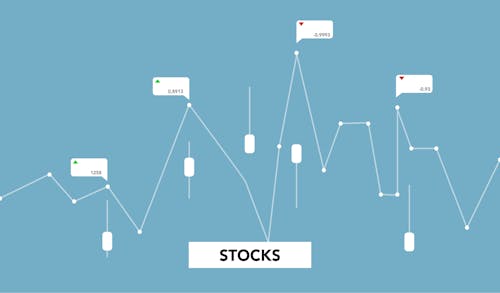
 Image Source: Pexels
Image Source: Pexels
The US stock indices closed moderately lower on Wednesday, with the Dow Jones Industrials Index falling to a 1-week low. At Wednesday’s close, the Dow Jones Industrial Average (US30) decreased by 0.51%, while the S&P 500 Index (US500) was down 0.27%. The Nasdaq Technology Index (US100) closed negative 0.18%. “Hawkish” minutes from the May 1 FOMC meeting showed that “many” officials doubted that Fed policy was tight enough to bring inflation down to target levels. As a result, officials suggested that the disinflation process is likely to take longer than previously thought, and some expressed a willingness to tighten policy further if risks to inflation materialize. But after the market closed, the S&P 500 (US500) and Nasdaq (US100) Indexes rose sharply on the strong NVDA report.Nvidia (NVDA) beat Wall Street prognoses on Wednesday. Its surging earnings due to its chip manufacturing dominance made the company an icon of the artificial intelligence boom. NVDA shares rose by 6% in after-hours trading to $1,006.89. The company’s stock has gained over 200% over the past year. Based in Santa Clara, California, the company has taken a leadership position in the hardware and software needed to adapt the technology to artificial intelligence applications.Equity markets in Europe were mostly down yesterday. Germany’s DAX (DE40) fell by 0.25%, France’s CAC 40 (FR40) closed down 0.61%, Spain’s IBEX 35 (ES35) lost 0.05%, and the UK’s FTSE 100 (UK100) closed negative 0.55%.The UK and German 10-year bond yields rose to 2-week highs after UK consumer prices slowed less than expected last month, raising questions about when the Bank of England (BoE) might start cutting interest rates. In addition, first-quarter wages in Germany rose more than expected, prompting the Bundesbank to warn of continued price pressures in the services sector.ECB President Lagarde noted yesterday that there is a strong possibility of such a move on June 6 if the data reinforces confidence that inflation will fall to 2% in the medium term. The Eurozone’s inflation rate currently stands at 2.4%, close to the ECB’s 2% target and well below the 7% a year earlier. In addition, fresh Eurozone GDP estimates confirmed that the economy came out of recession in the first quarter. The European Commission’s new prognoses still point to a soft landing scenario.WTI crude oil prices fell below $77 a barrel on Thursday, declining for the fourth consecutive session, as the latest minutes from the US Federal Reserve indicated its members’ willingness to further tighten policy if inflation rises, which could hurt energy demand in the world’s top oil consumer. EIA data also showed that US crude inventories rose by 1.825 million barrels last week, contradicting market expectations of a 2.55 million barrel decline. On Wednesday, Russia said it exceeded its OPEC+ oil production quota in April for “technical reasons” and will propose a plan to compensate for the mistake. All eyes are now on the upcoming OPEC+ meeting scheduled for June 1.Asian markets were mostly down on Wednesday. Japan’s Nikkei 225 (JP225) was down 0.85%, China’s FTSE China A50 (CHA50) decreased by 0.02%, Hong Kong’s Hang Seng (HK50) lost 0.13%, and Australia’s ASX 200 (AU200) was negative 0.05%. The Hang Seng Index (HK50) approached its lowest level in two weeks amid growing skepticism that China’s major moves to stabilize the property slump will lead to a sustained turnaround in demand and confidence. Comforting earnings results from technology giant Nvidia failed to lift sentiment, especially after the US said some of its steep tariff hikes on Chinese goods, including electric cars, chips, and medical products, would take effect on August 1.The Bank of Korea kept the policy rate at 3.5% for the 11th consecutive meeting, with markets expecting a possible rate cut in the 4th quarter. The country’s inflation fell to 2.9% y/y, which, despite the decline, is above the Bank’s 2% target. Notably, the economy grew by 3.4% in the first quarter of 2024, the fastest growth since the fourth quarter of 2021, leading to an upward revision of growth forecasts to 2.5% from previous estimates of 2.1%.In his latest interview, RBNZ Governor Adrian Orr downplayed the chances of another interest rate hike, saying the bank would only tighten policy if it needed to rein in inflation expectations. Meanwhile, an unexpected rise in the country’s retail sales has reduced the odds of a rate cut this year following the RBNZ’s rate decision and its hawkish prognosis on Wednesday.Singapore’s annual inflation rate stood at 2.7% in April 2024, holding steady for the second consecutive month and slightly above market estimates of 2.6%. The rate remains the lowest since September 2021.
Important events today:
More By This Author:Analytical Overview Of The Main Currency Pairs – Wednesday, May 22
The RBNZ Maintained Its Hawkish Bias, Leaving The Interest Rate At 5.5%
Analytical Overview Of The Main Currency Pairs – Tuesday, May 21
















